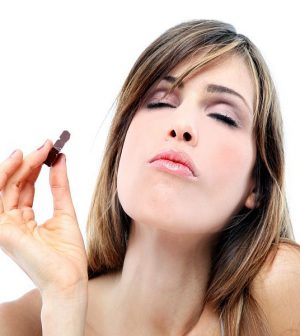- 10 Strategies to Overcome Insomnia
- Could Artificial Sweeteners Be Aging the Brain Faster?
- Techniques for Soothing Your Nervous System
- Does the Water in Your House Smell Funny? Here’s Why
- Can a Daily Dose of Apple Cider Vinegar Actually Aid Weight Loss?
- 6 Health Beverages That Can Actually Spike Your Blood Sugar
- Treatment Options for Social Anxiety Disorder
- Understanding the Connection Between Anxiety and Depression
- How Daily Prunes Can Influence Cholesterol and Inflammation
- When to Take B12 for Better Absorption and Energy
Love Black Coffee & Dark Chocolate? It Could Be in Your DNA

If you like your coffee black, it could be that your grandpa or your great-aunt did, too.
A preference for black coffee and also for dark chocolate seems to lie in a person’s genes, scientists report.
It’s not the taste that these individuals actually love, but it’s because their genes enable them to metabolize caffeine faster and they associate the bitter flavor with mental alertness.
“That is interesting because these gene variants are related to faster metabolism of caffeine and are not related to taste,” said study author Marilyn Cornelis, an associate professor of preventive medicine in nutrition at Northwestern University Feinberg School of Medicine in Chicago. “These individuals metabolize caffeine faster, so the stimulating effects wear off faster as well. So, they need to drink more.
“Our interpretation is these people equate caffeine’s natural bitterness with a psycho-stimulation effect,” Cornelis said in a university news release. “They learn to associate bitterness with caffeine and the boost they feel. We are seeing a learned effect. When they think of caffeine, they think of a bitter taste, so they enjoy dark coffee and, likewise, dark chocolate.”
Dark chocolate also contains a small amount of caffeine but predominantly theobromine, a caffeine-related compound, which is also a psychostimulant.
Past research on coffee’s benefits have relied on epidemiological studies that showed an association with the benefits rather than a causal link. This new research shows that these genetic variants can be used more precisely to study the relationship between coffee and health benefits, according to the study.
Previously, scientists were using the genetic markers for coffee drinkers in general, but the new findings suggest they are stronger markers for particular types of coffee drinkers, such as black coffee drinkers.
“Drinking black coffee versus coffee with cream and sugar is very different for your health,” Cornelis said. “The person who wants black coffee is different from a person who wants coffee with cream and sugar. Based on our findings, the person who drinks black coffee also prefers other bitter foods like dark chocolate. So, we are drilling down into a more precise way to measure the actual health benefits of this beverage and other food.”
Benefits attributed to dark chocolate and two to three cups of coffee per day include a lower risk of Parkinson’s disease, type 2 diabetes, heart disease and several types of cancer.
The findings were published Dec. 13 in Scientific Reports.
More information
The U.S. Centers for Disease Control and Prevention has information on healthy eating.
SOURCE: Northwestern University Feinberg School of Medicine, news release, Dec. 13, 2021
Source: HealthDay
Copyright © 2026 HealthDay. All rights reserved.










